Director/writer Mike Binder (Reign O’er Me, The Upside of Anger) didn’t want me writing that he wrote most of (significant portions of?) Owen Wilson‘s scene in front of that classroom of eight year- olds in You, Me and Dupree, a.k.a.”the Mothership scene” But I guess it’s okay to report this now that Wilson has told USA Today‘s Susan Wloszczyna almost the same thing. “Take the scene where Dupree speaks before a grade-school class on a career day,” she writes, “Wilson was supposed to give a spiel about being a copy-machine salesman. Instead, he and pal Mike Binder spent an afternoon brainstorming on a speech.”
Month: July 2006
Traumatic “WTC”?
Screenings of Oliver Stone‘s World Trade Center (Paramount, 8.9) are happening soon for NYC policemen and firefighters who risked their lives on 9/11. I was kind of scratching my head, though, when I read this USA Today quote from a spokesperson for “the union representing Port Authority of New York and New Jersey police officers,” warning that “ground-zero rescue workers [should] be aware that watching [World Trade Center] could cause post-traumatic stress disorder.”
I guess any film that takes 9/11 veterans back to that day is going to be upsetting. The first 20 or 25 minutes’ of World Trade Center that I saw in Cannes felt solid, realistic and urgent, but I haven’t gotten the idea that it rocks audiences in the same way that United 93 did. (A fair portion of it happens inside a dark hole.) But maybe not. A NYC friend who’s seen it says that “for some of these guys who were on duty that day, maybe. The magnitude of it is different than that of United 93. A lot of it take place at night…that’s when they were finally dug out. And that makes it kind of eerie. And there’s the claustrophobia factor, and above ground a lot guys running around, what’s going on here…a lot of confusion. I could see it being a fairly unsettling thing for anyone who was down there that day.”
Creating Davy Jones
Here’s the best story I’ve read about how the Pirates 2 CGI guys — visual-effects supervisor John Knoll and a crew from Industrial Light & Magic — created Billy Nighy’s Davy Jones. Knoll & Co. will probably receive awards and nominations down the road for their work, although I don’t think the Academy hands out Oscars for Best Gross-Out CG Villain.
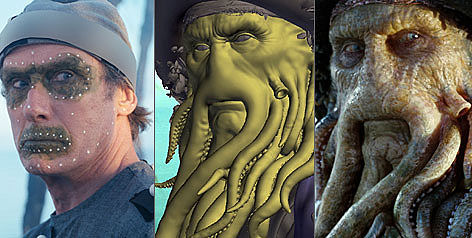
Listening to voices
“Along with many others, I was blown away by the twist at the end of The Sixth Sense. For two hours I’d snickered at the artiness of the compositions, at the way Bruce Willis‘s character was so ludicrously alienated from the world that he had no spatial relationship with anyone but the freaky kid. And then: Kaboom! Talk about using a critic’s jadedness to pull the rug out from under him! Shyamalan was still a showman back then, before he began to fancy himself a shaman — or is that shyaman? Now he just writes dead people.” — New York magazine critic David Edelstein.
Edelstein, by the way, really shows his cynical colors in the opening line of his review: “In the absence of a neurological disorder, a filmmaker who boasts about hearing voices is either scamming the congregation or has come to believe that the universe revolves around him.” Uhm…hello? There hasn’t been a visionary/creative person in the history of this planet who hasn’t heard ‘voices.’ This list includes the guy in the apartment next door, Thomas Becket, Leo Tolstoy, Edgar Allen Poe, Honore de Balzac, Yeshua of Nazareth and David Edelstein.
The reason Edelstein is a good writer is that he listens to his voices and goes with what they’re telling him. That’s how the process works, and yet Edelstein thinks anyone who openly talks about voices is boasting or “scamming” his audience. That’s not very perceptive. The voices I hear (and it’s probably the same for everyone) are always little whispers. They never poke you in the arm, but once you understand their pitch and tonality and precisely how they sound, there’s no missing them.
Russell does Linklater
Mike Russell‘s comic-strip interview format is concise, involving, intriguing. Here’s one with Waking Life director Richard Linklater that went up yesterday. I tried to find other movie-type interviews from Russell but the navigation options on the right margin are too oblique. Why doesn’t Russell offer a link that just says “previous movie-type interviews with head-trip directors, writers, actors, etc.”? Maybe he hasn’t done any.
As I was reading the Linklater thing I was saying to myself, “Does Linklater drive a shitty car with empty coffee cups and cigarette packs lying on the dashboard”? Then I read that the interview was done over the phone, and soon after I began to conclude the drawings were probably inspired by the milieu in Linklater’ s Waking Life.
I also like what Russell wrote about the Frat Pack a while back. “A while back, I suggested that the half-funny, half-cliche Wedding Crashers was just lazy enough that it might signal the cusp of a decline” of Hollywood’s new comedy mafiosos — Owen Wilson, Ben Stiller, Will Ferrell, Vince Vaughn, Jack Black, et. al., “Specifically, I asked: ‘How long until ‘Hollywood’s funniest clique’ [as described by New York Times writer Sharon Waxman] pulls an Ackroyd and starts to reek of smug, louche decay?” (Webster’s defines “louche” as ad adjective meaning “questionable taste or morality; decadent.”)
Rickey on Shyamalan
“The Village and Lady in the Water are the filmmaker’s protest songs,” says the Philadelphia Inquirer’s Carrie Rickey. “The 2004 film, about an isolated religious community, criticizes fundamentalists who shelter their flock from the modern world. The new movie damns cynics who cannot take social action and connect with others in a meaningful way.”
Rickey writes very concisely and quite well, and it’s clear from the piece she’s a Shyamalan fan. One presumes this has something to do with hometown loyalties and diplomacy, as she doesn’t include her reactions to Lady in the Water in the piece. The idea behind the piece is to observe the minutiae of Night’s life in a smart, gentle way.
She mentions that Night’s last four films “have collectively taken in more than $1.5 billion” which is closer to $10 bill” when you “consider that box office represents on average 16 percent of a film’s revenues,” and she quotes Hollywood Reporter columnist Anne Thompson as saying “only John Lasseter at Pixar can boast a record like Night’s,” says Thompson, adding that Lasseter “didn’t write and direct all his movies.” But the Lasseter comparison is wrong/incomplete, as David Poland has taken the time to point out.
Elsewhere in the piece she writes that “short-term profits are nice, but long-term resonance matters more to Shyamalan. He uses a different metric. The filmmaker read in Malcolm Gladwell‘s Blink about the cola wars, in which Pepsi won the supermarket aisle ‘sip test’ but Coke was the victor in the ‘take-home’ contest, being the beverage consumers drank at backyard barbecues. ‘I measure the success of a movie by the degree of difficulty plus the aspiration times the take-home effect,” he says. Staying power is what counts.”
This is all very nice, but let’s cut to the chase by repeating something I said earlier: the best thing Night can do for himself now is to direct one or two first-rate scripts that he hasn’t written, and make hits out of them. The second best thing he can do is to give up on the idea of reaching huge audiences. He needs to abandon the mid-budget realm and go into the indie world and make films that he just wants to make and forget about monster profits. It’s clear to me after reading a lot about him over the past couple of weeks that Night is a prisoner of his own legend, but also of a plush country-estate lifestyle.
A person as rich as Night, a man who lives through dreams but subjecting himself to such strictly regulated and heavily-insulated circumstances, can’t hope to connect with life’s unruly desperation.
Shyamalan Intervention
Newsweek‘s Sean Smith has written that Lady in the Water director M. Night Shyamalan needs a career intervention. He tries to provide it, in fact, with this piece. “It feels like the entire town is rooting for him to fail,” a studio exec tells Smith. “Is there a 12-step program for egos?” In a remarkable display of maturity, Newsweek implicity accepts some of the blame for Shyamalan’s arrogance. “When your fine magazine proclaimed him ‘The Next Spielberg’ on the cover, this was all fated,” says a studio exec.
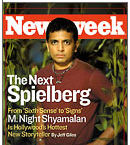
Oh, and by the way, I very much agree with this quote about about a once-great director who, I feel, lost it at the end of his career: “The smaller you make your world, the less of an artist you can really be,” says an indie exec. “Look at Stanley Kubrick. If you see Eyes Wide Shut it’s clear he hadn’t left the house in 20 years.”
Santa Monica Airport shot
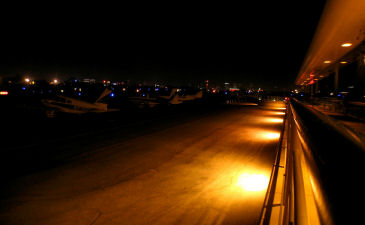
One of the very best things you can do at night in this town is drive over to Typhoon around 8:30 pm for a couple of drinks and then walk out the rear entrance and onto the fenced-off walkway adjacent to the Santa Monica Airport tarmac, and just walk out and stand and stare at the private planes landing and taking off. Shot taken Saturday, 7.15.06, 10:05 pm.
Does “Flags” Have It?
I’m being told by someone who doesn’t necessarily know anything solid that Paramount/DreamWorks’ plan on the second Clint Eastwood Iwo Jima film — Red Sun, Black Sand — is to bring it out in early ’07 and not release it, platform-style or otherwise, in late ’06. If this is the determination (and I say “if”) I don’t know if this is the right way to go, as I tried to explain the other day.
The reason I think they may be wrong is that I’m a little uncertain about the Oscar worthiness of Flags of Our Fathers, based on a reading of a draft of Paul Haggis‘s script. Eastwood’s film might have much more going for it than is indicated by Haggis’s script (which I didn’t read a recent draft of), but last March I ran a piece about how it reads, and wrote the following:
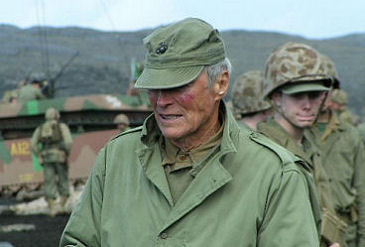
“I’m not saying Flags [doesn’t look like] a possible Oscar favorite, or that it doesn’t have the earmarks, in fact, of a presumptive front-runner. But all I can really say for sure, having slept on Haggis’s 119-page script, is that I’m genuinely impressed, but at the same time I’m wondering how much broad-based appeal the film will turn out to have.
“Put bluntly, the script reads like Saving Private Ryan‘s artier, more glum- faced brother. It has a lot of the same battle carnage and then some, a bit of the old-WWII-veteran-looking-back vibe and minus the manipulative Spielberg tearjerk factor but also with less of a narrative through-line.
“Fathers is a sad, compassionate, sometimes horrifically violent piece that’s essentially plotless and impressionistic and assembled like a kind of time- tripping poem — a script made from slices of memory and pieces of bodies and heartfelt hugs and salutes from family members and politicians back home, and delivered with a lot of back-and-forth cutting.
“So it’s basically a montage thing that’s obviously more of an art film than a campfire tale, and that means that the sector that says ‘give us a good story and enough with the arty pretensions’ is going to be thinking ‘hmmm’ as they leave the screening room.”
Shyamalanfreude
“I’d like to introduce a new term into the Hollywood vernacular: Shyamalanfreude (n.), defined as a malicious pleasure taken in the failures of M. Night Shyamalan. I have a feeling it’s going to reach epidemic levels this coming week.” — Eric Williams
Two “Lady” Reviews
A rave review of M. Night Shyamalan‘s Lady in the Water (yes…a rave) by Coming Soon’s Edward Douglas , and a total rip-job by Variety‘s Brian Lowry. Lowry starts his piece with almost the same words I wrote in an item three or four days ago, to wit: “Vindication is rarely as swift or complete as that likely awaiting the Disney execs who passed on M. Night Shyamalan‘s latest effort Lady in the Water. After Disney balked, the director carted the project to Burbank neighbor Warner Bros., then lambasted his former studio for a lack of vision in a tie-in, tell-some book. Disney’s misgivings were well founded.”
Longer “Kong”
I saw King Kong twice last December, and then I tried to watch the DVD a couple of months ago. Not even bothering with the nothing part — i.e., the first 70 minutes — I started my viewing with Kong taking Naomi Watts into the jungle and Adrien Brody and Jack Black and the other guys following. I sat down and I tried but I couldn’t stay with it. In fact I couldn’t stand it.
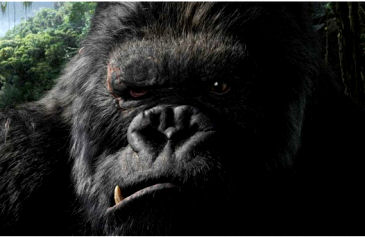
Jackson’s shameless huckster instincts — the anything-goes, push-it-to-the-limit choregraphy and total-madman camerawork that he brings to the big action scenes — don’t just grate on you after a couple of times. They make you feel ill. The reason for this nauseau is realizing that the big Kong moments are entirely about Jackson’s Barnum & Bailey ego — the man is an incorrigible showoff and an overcoddled enfant terrible— and not in the least about his wanting to get the audience to believe in the characters or the reality of the situation(s) they’re up against.
I couldn’t help but giggle and feel turned on by the Dino Run sequence when I first saw it (my second viewing happened the next day), but try watching it on DVD and you’ll see what I mean. After a minute or two all you want to do is go into the kitchen and find a bag of tortilla chips.
Naturally…what else?…Jackson and Universal Home Video will soon be bringing out an extended version of King Kong on DVD, lasting God knows how much longer. It’ll probably make money because of the extra monster sequences and whatnot, and the visibility of the new DVD will get a boost from a special promotion at Comic Con next weekend.
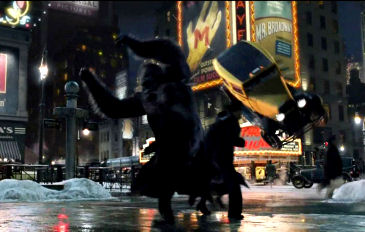
I don’t think any filmmaker has answered criticisms of his film being too long in this manner since…well, since director Lawrence Kasdan came out with an even longer cut of Wyatt Earp (212 minutes) after critics said his 191 minute theatrical version was too much. (My opinion is that the theatrical cut of Wyatt Earp was satisfyingly full and rich, and that the 212-minute version was even more of a great meal…really. It’s a meditative right-wing character piece that really works.)
Last March Entertainment Weejly‘s Hannah Tucker asked Jackson if fans can”expect an extended version of Kong on DVD in the future?” and jackson replued: “I hope so — that’s very much up to Universal. Obviously, doing an extended cut of Kong is expensive…. Every extra minute of film that you add, you’re adding potentially another 20 or 30 more visual effects shots. So I think Universal are getting their heads around all that. We’re figuring out what the sequences could be, because we do have a lot of really great scenes that we didn’t put into the movie — some very very exciting dinosaur sequences — so I’m hoping there will be an extended cut.”
